Geoengineering, Magical universities, and the private space industry

Greetings!
It’s amazing at how quickly things seem to have turned with the COVID-19 pandemic. I guess that’s to be expected when you’re on an exponential curve. Last week, we learned that schools would be closed until April. No worries — we have a solid daycare that would be willing to take both kids. Tuesday night, the governor updated his executive order to include state-licensed daycares in that order, meaning that both kids would stay home starting Wednesday for the foreseeable future. Cue rapid adjustments. Apparently we’re in for some more stringent shelter-in-place restrictions in the coming day or two.
Thus far, we’ve been doing okay: we’ve put together a schedule for Bram to continue his school work, and we’re getting by day by day. Iris is a bit more work, because she needs more constant attention. But we’ll get through.
More than one person has pointed out that this feels very much like living through a science fiction novel: the first chapters that highlight the show off the normal world as it falls into chaos.
Mind, I don’t think that’ll happen. But it’s certainly interesting to watch. Stay safe out there.
Revealing Eliot Peper’s Veil
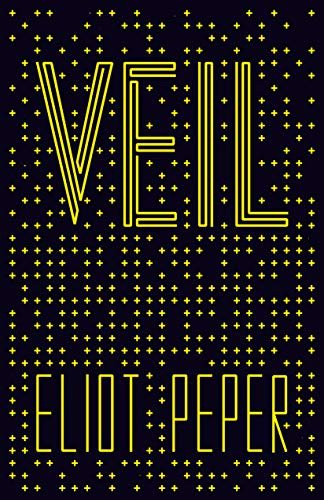
This is a bit of a fun thing: SF author Eliot Peper is releasing his next novel, Veil, in May, and I had a chance to talk with him about it — the first time that he’s done so. I’ve been a big fan of his for a while: his self-published novel Cumulus (you can find my review for it on io9) was a really interesting blend of the scary potential of Silicon Valley, climate change and wealth inequality, something that’s run through most of his stories, including his next:
When her mother dies in a heat wave that kills twenty million, Zia León abandons a promising diplomatic career to lead humanitarian aid missions to regions ravaged by drought, wildfires, and sea level rise.
What Zia doesn't know is that clandestine forces are gathering around her in pursuit of a colossal secret: someone has hijacked the climate, and the future of human civilization is at stake.
To avoid a world war that appears more inevitable every day, Zia must build a coalition of the powerless and attempt the impossible. But success depends on facing the grief that has come to define her life, and rediscovering friendship, family, and what it means to be true to yourself while everything falls apart.
Veil is your next upcoming novel. What's the elevator pitch for it, and how did you come up with the idea?
Veil is a science fiction thriller about a near-future in which someone has hijacked the climate. The story is about finding a sense of renewed agency in a world spinning out of control, and grapples with family, friendship, loss, and what it means to live in the Anthropocene.
A couple years ago I listened to Tyler Cowen interviewing award-winning journalist Charles C. Mann. They were discussing the growth in scientific research into geonengineering — attempts to directly manipulate the global climate to reduce the worst aspects of climate change using everything from marine bacteria that change atmospheric chemistry to ingenious machines that suck CO2 out of the air.
But there's one approach to geoengineering that's by far the most feasible: using high-altitude planes to spray inert aerosols into the stratosphere that reflects a tiny bit of incoming sunlight, slowing global warming. The craziest part is that such an effort would only cost approximately two billion dollars a year — cheap enough that any country or even an individual billionaire could go ahead and do it unilaterally. Can you imagine the extent of the potential social, political, economic, and environmental implications?
Holy shit, I thought. Somebody needs to write a novel about this.
And Veil was born.
There was an instance in 2012 of someone attempting some geoengineering like that off the coast of Canada. How much do instances like this play into your world?
Over the past few years, geoengineering has transitioned from an idea discussed in academic journals to a subject that is regularly covered in The New York Times, The Economist, and The Atlantic. Partly this is because there is more and more scientific research and experimentation going on, with increasing funding from governments and even individuals like Bill Gates.
But I think there's a complementary reason: we've been talking about climate change for decades, but it feels like our political institutions have consistently failed to meaningfully address the problem. We're living through the results: wildfires in Australia, melting Arctic sea ice, deadly heat waves, rising sea levels, etc. So the real question is: what now? How do we find a way to live in a changing climate?
Some people are hoping that geoengineering might contribute to answering that question. In doing so, it raises new questions of its own: who gets to decide what kind of interventions happen? How are the results attributed? How do we make sure it doesn't reenforce the impacts of environmental and economic inequality? Etc.
More than any single line of research, those fundamental questions inform the future Veil imagines.
A bigger theme on your novels is how companies consolidate and use their power — not always for the good of human civilization or society. How did that play out here?
Power is all about relationships, and I'm fascinated by how those relationships change. When we try to understand power, labels often get in the way of clarity. For example, in the 17th century, the Dutch East India Company became the first proto-modern multinational corporation — yet in many, often horrific, ways, it acted like a colonial government. And technology played a large role in its growth, namely Dutch shipbuilding innovations that enabled vessels to carry more cargo with fewer crew members, accelerating trade.
Today, we're seeing huge tech companies doing things that only governments did during our parent's lifetimes — for better and worse. Each and every one of us lives at the intersection of a vast array of power dynamics: from your national government to your employer to your city council to your PTA to your book club to you looking in the mirror. These relationships are messy and overlapping and always evolving—and I love to explore this territory in fiction.
Veil grapples with some of this explicitly by extrapolating some of the potential geopolitical implications of geoengineering, and implicitly by asking how this might play out in people's individual lives. How does intentional, institutional manipulation of nature change how we think about "wilderness"? What would it feel like to make major individual decisions that might impact people in New York City and rural Nigeria in contradictory ways? What would it feel like to live at the mercy of such decisions without getting to participate in them?
The world is changing so fast that it will take generations for us to process everything through the sieve of culture — to distill fact into meaning.
What do you hope people will take away from this novel?
My dearest hope is this that this novel takes people away! At its best, fiction transports us, and leaves us changed. If Veil provides a fun diversion during these strange times, fantastic. All the better if the journey empowers readers to look at the world from a new angle, find a fresh perspective on their own lives.
As a reader, I am so very grateful for the stories I love, stories that have become a part of who I am. If even a single stranger truly connects to Veil and its characters, I call that success. This story is my small contribution to the chaotic, mesmerizing, sublime compost heap of culture.
You can preorder the book now (out May 20th).
Ninth House
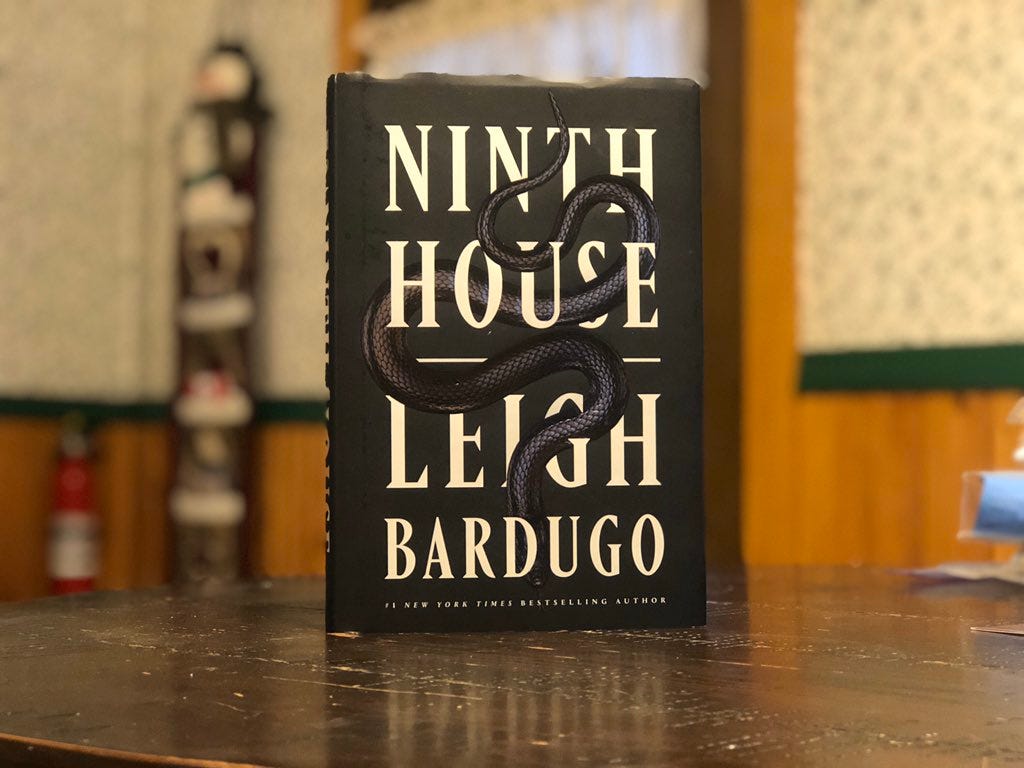
One of the books that largely slipped under my radar last year (I somehow missed it for my Polygon list the month that it was released) was Leigh Bardugo’s Ninth House, an urban fantasy about magic and secret societies at Yale University.
The book is about a young woman named Galaxy “Alex” Stern, who has a particular ability: she can see ghosts. That ability catches the attention of one of Yale University’s secret societies, Lethe, which plays an important role at the institution: it keeps the other eight magical secret societies in line. They use magic for a bunch of things: predicting the stock market, creating power and wealth, etc, and as one might expect from some college students, they’re not always wielding it responsibly. Alex is thrown into the deep end of upper-class society, and into the realm of this sort of grim magic.
The through-line of this novel is all about that sort of imbalance of power: how does one utilize the enormous power at their disposal responsibly? As one might expect, it’s pressingly relevant in 2019/2020, because Bardugo plays with this along a couple of levels. There’s power at the institutional level, in how the university manages its students and magical talents, while on the student level, Alex contends with entitled students acting poorly. There’s a notable incident in which a student takes illicit video of his encounter with an influenced student, and the fallout of that. Wrapped around that storyline is a mystery about the death of a young woman, and Alex’s efforts to help bring her death to some sort of justice, as well as a couple of other, deep-seated mysteries that pop up along the way — stuff that will shake the university to its foundations.
Bardugo’s take on magic is a really innovative one: there are certainly plenty of “magical academy” novels that have come out since Harry Potter, but her take on power and responsibility pushes Ninth House up above the rest, in that it’s tapping into some of of the problems we face in society today.
This is something that I’ve long held up as one of speculative fiction’s strengths: the ability to recognize and confront issues in society, rather than just spinning them off into whimsical adventures that a premise brings. Sarah Gailey’s 2019 novel Magic for Liars falls into similar territory — and the two complement one another nicely for their pessimistic and realistic takes on how teenagers / college students would utilize magic if they could. The answer? Not well.
Delta-V
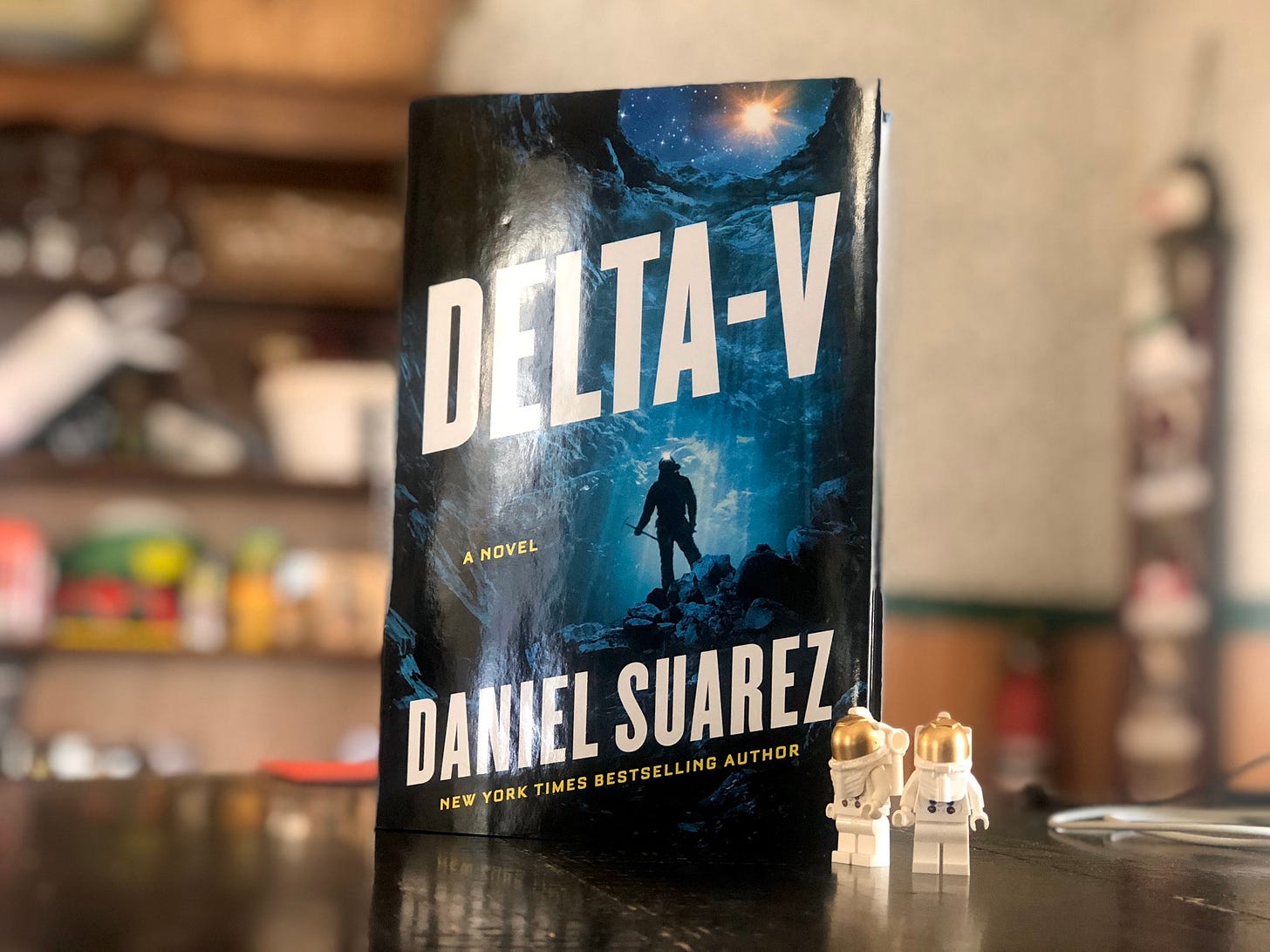
Take every bit of news and every promise that you’ve heard from the likes of SpaceX’s Elon Musk and Blue Origin’s Jeff Bezos (and their fanboys), compile that into a novel, and you get Daniel Suarez’s novel Delta-V. A billionaire named Nathan Joyce recruits daredevil cave diver James Tighe to a secretive project: a crewed mission to an asteroid to kickstart a new industry for humanity.
Tighe is someone who is looking for the next thrill, and he’s dumped into an intense training school for Joyce’s potential astronauts. There, he and his fellow recruits are tested to their limits, given no privacy, then is eventually tasked with the first mission out to a remote asteroid to begin mining it. Alongside his adventure, Suarez recounts Joyce’s efforts to stand up his secretive project to kickstart this potentially-massive industry, while parroting many of the same talking points that you might have heard about the benefits of space exploration and space mining.
Delta-V is what I’d call a solid beach read. It’s breezy, brisk, and moves along at a nice clipped pace. You’ll recognize all of the characters here — confident men and women adventurers looking to get in on the ground floor of history, while thinly reskinned versions of Bezos and Musk pop up to talk about their ventures. Along the way, Suarez explores what such an industry might look like through the lens of Silicon Valley secrecy and ambition.
The book is a lot of fun, but it’s essentially an argument for private spaceflight wrapped up in a novel. Suarez has some interesting ideas: how established legal norms and regulations potentially hold back something like a privatized industry, while also holding up the predictable motivator for astronauts: adventure. The idea that we go to space for the next adventure and into a brand new, untapped frontier is already a well-worn path for science fiction authors and space proselytizers, and Suarez’s characters hit practical challenge after practical challenge as they work to mine the asteroid for materials. This is pretty par for the course for Suarez (I reviewed his book Influx a couple of years ago for io9 with pretty much the same conclusion). He’s part of a group of authors like Michael Crichton and Blake Crouch, who spin together a good adventure with a lot of plausible hard science, but which ultimately feel a bit like the end goal is fat paycheck from a movie studio for the next big-budget science fiction blockbuster — but who never really comes down on any sort of conclusion or thought about what the adventure means.
That’s not necessarily a bad thing — it’s a fun read, and I enjoyed the hell out of it (the audiobook is pretty good, too). I’m a firm advocate for some art being there just for the entertainment value, and that for every heady science fiction project like Arrival, you need something like Battle: LA, with lots of action and bright shiny things. Delta-V delivers all of that, and it’s a fun reaffirmation of the coming space race.
Hard Contact
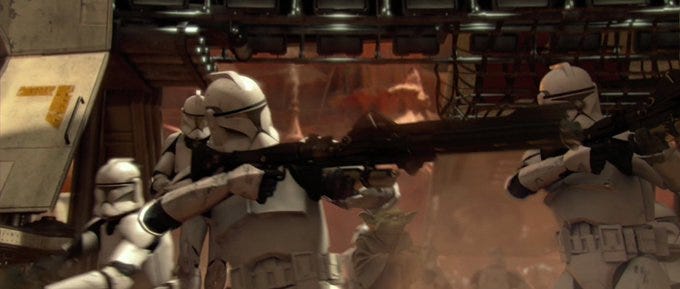
Recently, I published an essay on Polygon that’s been bubbling up in my mind about the return of The Clone Wars and why it’s one of the better entries in the Star Wars franchise. There’s a lot to like about it: it successfully rehabilitates some of the Prequel trilogy by providing some emotional depth and better characterization to the principal characters, as well as introduces us to a handful of really excellent ones, like Ahsoka, Captain Rex, and Hondo. It still has its dumb moments, but they’re fewer and further between.
What got me thinking about this was watching Rise of Skywalker back in December: there’s a handful of new characters that we learn were former stormtroopers who rebelled against the First Order and struck out on their own, ending up on one of Endor’s moons. Like Finn’s reveal in The Force Awakens, it’s a profound moment: we don’t usually see the curtain drawn back on the faceless Imperial forces all that often in the films.
In the Expanded Universe and The Clone Wars, however, that’s a major thing, and when authors explore the relationship of power and the characters who serve in the armored forces, we get some pretty profound revelations.
The two EU sources that I looked to were Aaron Allston’s “The Pengalan Tradeoff” and Karen Traviss’s Republic Commando: Hard Contact, which I recently re-read. I don’t like to draw too many distinctions between tie-in fiction and non-franchise works, but for a tie-in novel, Traviss’s book is a great military SF novel in its own right. That story, about a team of commandos tasked with raiding a planet, is crisp and focused entirely on these four men who are bred for one thing: warfare. Over the course of the sequels, Traviss did quite a bit more digging into that.
Those works are no longer canon, however, but The Clone Wars series certainly drew some inspiration from them, particularly with Rex and his fellow clones. I rewatched the series recently in advance of the show’s return to Disney + (and watched seasons 4, 5, and 6 for the first time), and that tendency only grows deeper, particularly in the latest season, which follows a team of clones called The Bad Batch.
I won’t reiterate what I wrote in that essay, but I think it’s worth noting that this is one of the underserved parts of the Star Wars franchise — and probably one reason why Rogue One struck such a tone with fandom. Warfare brings out some interesting stories about the human condition, something that the franchise’s more mythical elements really don’t, or at least, not in the same way.
Further Reading
- Al Worden Remembrance. Apollo 15 astronaut Al Worden passed away on the 18th, and Francis French, who wrote a couple of essential books about the space race — as well as co-wrote Worden’s autobiography — has a nice remembrance.
- Avatars Inc. XPRIZE has released a new anthology called Avatars Inc., with an incredible table of contents. I profiled it over on Tor.com.
- Failure in Lego. Amie Dansby, a friend (and someone who I interviewed for The Book), was recently a contestant in Fox’s Lego Masters reality show. Sadly, she was cut from the show, which is a shame: she and her partner Krystle had some really intriguing builds, but were somewhat … under utilized(?) in the series. She put together an interesting piece about the lessons learned from failing and what she learned from the series.
- Live-Action Ahsoka. This is some pretty exciting news: Ahsoka apparently will be in The Mandalorian when it returns later this fall. I love the character, and can’t wait to see her in the flesh. That said, Rosario Dawson is rumored to be playing her, someone who’s being sued for assault and transphobic harassment of a family worker. Less enthused for that. Not sure why Ashley Eckstein, who voiced the character, isn’t playing her (admittedly, she doesn’t have a strong TV track record, and physically too short for the character), but maybe they’ll keep her for the voice? One can hope.
- Make Room! The Guardian’s Sam Jordison has a good retrospective about Harry Harrison’s novel Make Room! Make Room! (the basis for Soylent Green), and how it was a book that was a bit ahead of its time in anticipating some of the issues that we face today, even if the main point of the book — overpopulation — hasn’t turned out to be the issue that it was predicted to be.
- Soviet SF. Winnie Lee has a fantastic piece / Q&A over on Atlas Obscura about Soviet-era science fiction art, which is appearing in an upcoming book, Soviet Space Graphics: Cosmic Visions from the USSR.
- Three-Body Anime. We’ve all been waiting for an adaptation of Cixin Liu’s The Three-Body Problem, but apparently, there’s been one running for years — animated with Minecraft, of all things. It’s pretty cute.
- Wizarding Malfeasance. LARPing can be big business, until it isn’t. Elizabeth Ballou has a fantastic feature up on Kotaku about Dziobak Larp Studios, which ran a Harry Potter-themed event, and how it fell apart.
Currently Reading
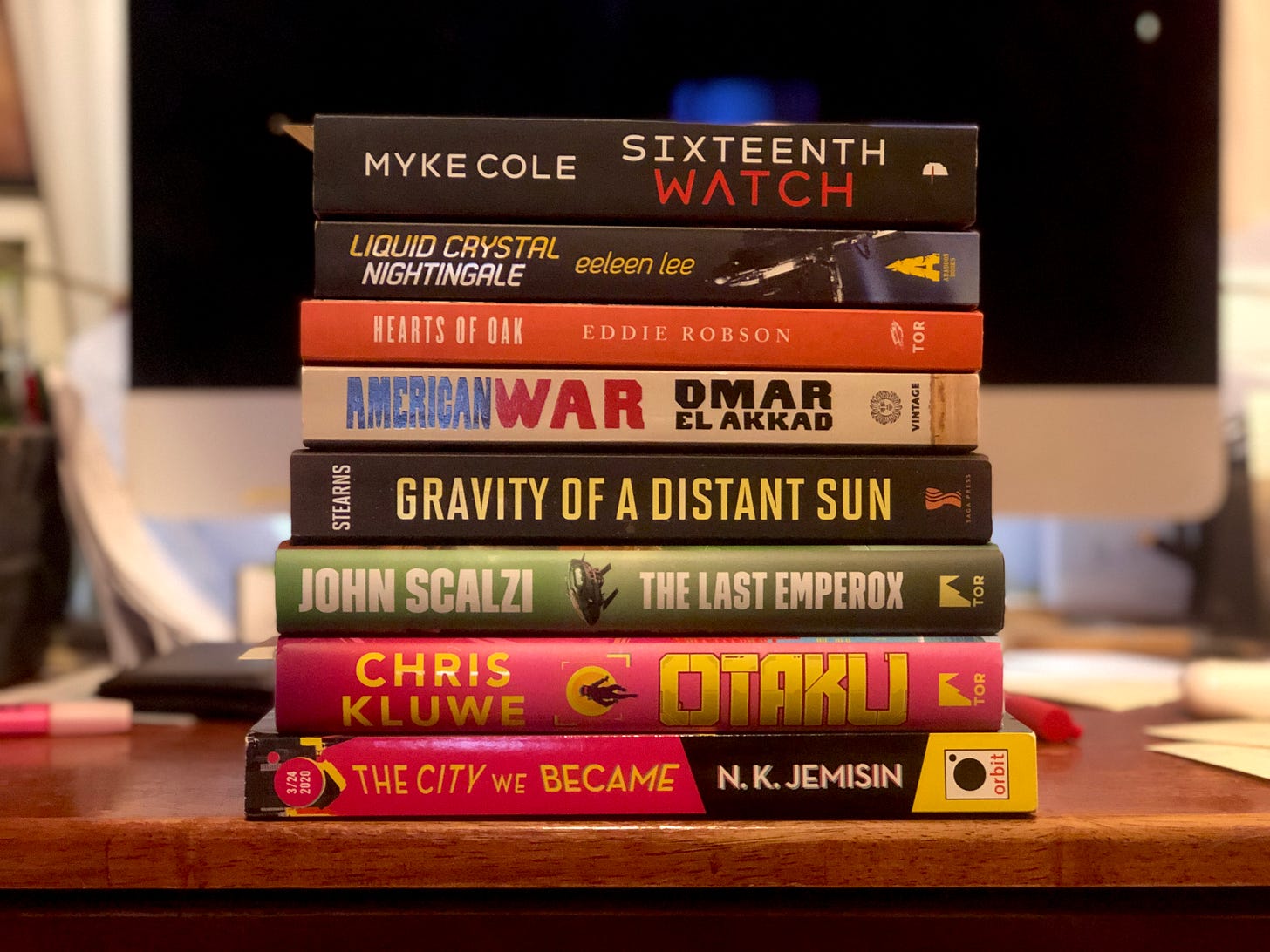
My to-read list hasn’t changed too much since my last letter (having kids at home certainly cuts down on the amount that one can read.) I’ve just finished Tochi Onyebuchi’s Riot Baby, which was splendid, and my immediate reading list includes Myke Cole’s Sixteenth Watch, Chris Kluwe’s Otaku, and R.E. Stearns’ Gravity of a Distant Sun. Next up is N.K. Jemisin’s The City We Became, Hearts of Oak by Eddie Robeson, and another book that I just picked up from a free pile, American War by Omar El Akkad. I also just got in a copy of Elleen Lee’s Liquid Crystal Nightingale, John Scalzi’s The Last Emperox, as well as a couple of others that have been on The List.
That’s all for now: I hope that you’re staying healthy and taking the necessary precautions. Let me know what you’re reading while you’re stuck inside, weathering the storm.
Andrew
As always: if you liked this letter (let me know! I’m starved for social contact right now), consider forwarding it to a friend, or sharing it on social media.